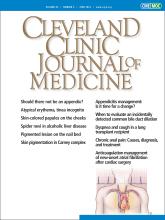In Reply: We thank Drs. Joseph and Rohde for their insightful comments. We enthusiastically concur that practitioners should maintain a broad differential. This is particularly true in the COVID-19 era. In our article, the patient presented with unilateral pulmonary edema post-COVID-19, warranting inclusion of multisystem inflammatory syndrome in adults (MIS-A) in the differential diagnosis. However, after dissecting the case at the fine-scale level, we identified 3 critical precluding factors that effectively ruled out MIS-A:
First, although the patient presented with impairments in cardiac function, other primary and secondary clinical criteria indicative of MIS-A, such as fever, rash, nonpurulent conjunctivitis, neurologic impairments, abdominal pain, vomiting, diarrhea, and thrombocytopenia were not documented.1
Second, among the spectrum of severe cardiac illnesses observed in MIS-A patients, acute myocarditis has been investigated and reported in detail.2 In our patient, no pericardial effusion was seen on computed tomography and transthoracic echocardiography. Furthermore, transthoracic echocardiography identified an underlying mitral valve regurgitation, which was the most likely factor contributing to the decompensated heart failure.
Third, the clinical course in our patient was not consistent with acute myocarditis. The patient’s condition improved under the administration of diuretics and nitrates. Inotropics and vasopressors were not warranted.
Although MIS-A was ultimately ruled out, our colleagues from Mayo Clinic rightfully highlight the importance in the COVID-19 era of maintaining a broad differential including MIS-A when approaching post-COVID-19 patients presenting with heart failure.
- Copyright © 2022 The Cleveland Clinic Foundation. All Rights Reserved.






